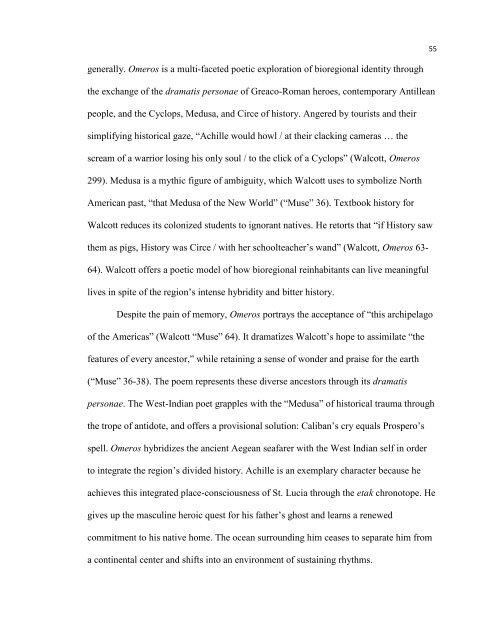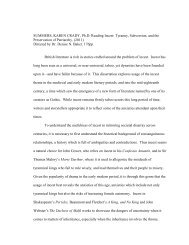RE-INHABITING THE ISLANDS - The University of North Carolina at ...
RE-INHABITING THE ISLANDS - The University of North Carolina at ...
RE-INHABITING THE ISLANDS - The University of North Carolina at ...
Create successful ePaper yourself
Turn your PDF publications into a flip-book with our unique Google optimized e-Paper software.
55<br />
generally. Omeros is a multi-faceted poetic explor<strong>at</strong>ion <strong>of</strong> bioregional identity through<br />
the exchange <strong>of</strong> the dram<strong>at</strong>is personae <strong>of</strong> Greaco-Roman heroes, contemporary Antillean<br />
people, and the Cyclops, Medusa, and Circe <strong>of</strong> history. Angered by tourists and their<br />
simplifying historical gaze, ―Achille would howl / <strong>at</strong> their clacking cameras … the<br />
scream <strong>of</strong> a warrior losing his only soul / to the click <strong>of</strong> a Cyclops‖ (Walcott, Omeros<br />
299). Medusa is a mythic figure <strong>of</strong> ambiguity, which Walcott uses to symbolize <strong>North</strong><br />
American past, ―th<strong>at</strong> Medusa <strong>of</strong> the New World‖ (―Muse‖ 36). Textbook history for<br />
Walcott reduces its colonized students to ignorant n<strong>at</strong>ives. He retorts th<strong>at</strong> ―if History saw<br />
them as pigs, History was Circe / with her schoolteacher‘s wand‖ (Walcott, Omeros 63-<br />
64). Walcott <strong>of</strong>fers a poetic model <strong>of</strong> how bioregional reinhabitants can live meaningful<br />
lives in spite <strong>of</strong> the region‘s intense hybridity and bitter history.<br />
Despite the pain <strong>of</strong> memory, Omeros portrays the acceptance <strong>of</strong> ―this archipelago<br />
<strong>of</strong> the Americas‖ (Walcott ―Muse‖ 64). It dram<strong>at</strong>izes Walcott‘s hope to assimil<strong>at</strong>e ―the<br />
fe<strong>at</strong>ures <strong>of</strong> every ancestor,‖ while retaining a sense <strong>of</strong> wonder and praise for the earth<br />
(―Muse‖ 36-38). <strong>The</strong> poem represents these diverse ancestors through its dram<strong>at</strong>is<br />
personae. <strong>The</strong> West-Indian poet grapples with the ―Medusa‖ <strong>of</strong> historical trauma through<br />
the trope <strong>of</strong> antidote, and <strong>of</strong>fers a provisional solution: Caliban‘s cry equals Prospero‘s<br />
spell. Omeros hybridizes the ancient Aegean seafarer with the West Indian self in order<br />
to integr<strong>at</strong>e the region‘s divided history. Achille is an exemplary character because he<br />
achieves this integr<strong>at</strong>ed place-consciousness <strong>of</strong> St. Lucia through the etak chronotope. He<br />
gives up the masculine heroic quest for his f<strong>at</strong>her‘s ghost and learns a renewed<br />
commitment to his n<strong>at</strong>ive home. <strong>The</strong> ocean surrounding him ceases to separ<strong>at</strong>e him from<br />
a continental center and shifts into an environment <strong>of</strong> sustaining rhythms.
















